Saga of Schulberg and Zigman’s Nuremberg trial documentary
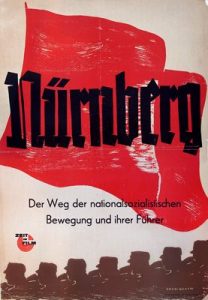 The 1948 film Nuremberg: Its Lesson for Today will be screened for the very first time in the United States at the Fort Myers Film Festival. Although Supreme Court Justice Robert H. Jackson expected the film to provide an enduring lesson for posterity, the U.S. War Department suppressed the film’s release. Now, 73 years later, cineastes attending the final day of this year’s FMFF will finally get to see the film that documented the prosecution of more than 20 high Nazi officials (including four members of the Nazi High Command) using original footage compiled by Joseph Goebbels’ Reich Ministry of Propaganda and Public Enlightenment documenting the rise of the National Socialist Party as well as the concentration camps created to exterminate Jews, homosexuals
The 1948 film Nuremberg: Its Lesson for Today will be screened for the very first time in the United States at the Fort Myers Film Festival. Although Supreme Court Justice Robert H. Jackson expected the film to provide an enduring lesson for posterity, the U.S. War Department suppressed the film’s release. Now, 73 years later, cineastes attending the final day of this year’s FMFF will finally get to see the film that documented the prosecution of more than 20 high Nazi officials (including four members of the Nazi High Command) using original footage compiled by Joseph Goebbels’ Reich Ministry of Propaganda and Public Enlightenment documenting the rise of the National Socialist Party as well as the concentration camps created to exterminate Jews, homosexuals 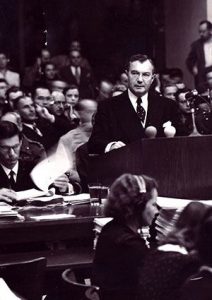 and others deemed undesirable by the Reich.
and others deemed undesirable by the Reich.
The first Nuremberg trial began on November 20, 1945. Legal teams from the United States, Great Britain, France and the Soviet Union shared responsibility for the prosecution. The verdict was rendered October 1, 1946.
In his capacity as lead U.S. prosecutor, Justice Jackson made two historic decisions:
- First, he decided to use the Reich’s own propaganda films as evidence of the defendants’ guilt.
- Second,
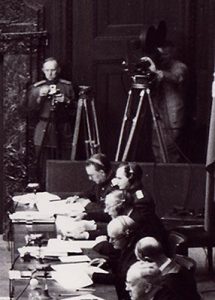 he wanted the trial itself to be filmed. While all of the proceedings that transpired over the course of the 11-month trial were recorded, the Office of Criminal Counsel only allowed Army Signal Corps cameramen o film 25 hours of footage.
he wanted the trial itself to be filmed. While all of the proceedings that transpired over the course of the 11-month trial were recorded, the Office of Criminal Counsel only allowed Army Signal Corps cameramen o film 25 hours of footage.
Made under Goebbels’ direction, the propaganda films touted the superiority of the “Aryan race” (“Wunschkonzert,” 1940), the superiority of the German Reich (“Kadetten,” 1941) or the superiority of the “greatest generals of all time” (“Der grosse König,” 1942). The films were very popular. As many as 25 million paying viewers flocked to theaters to watch the films between 1938 and 1945.
A special OSS team 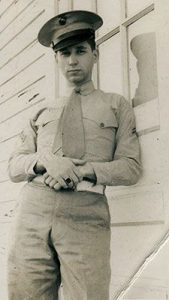 was formed for the purpose of securing the needed films. Hollywood director John Ford was placed in charge of this initiative. He quickly dispatched Stuart Schulberg and his brother Budd to Europe, but when they arrived in Germany, they discovered that efforts were well under way to destroy the incriminating footage. However, they were able to locate enough extant footage to create a four-hour film called The Nazi Plan and a one-hour compilation entitled Nazi Concentration Camps. These were screened for the jurors on December 1, 1945.
was formed for the purpose of securing the needed films. Hollywood director John Ford was placed in charge of this initiative. He quickly dispatched Stuart Schulberg and his brother Budd to Europe, but when they arrived in Germany, they discovered that efforts were well under way to destroy the incriminating footage. However, they were able to locate enough extant footage to create a four-hour film called The Nazi Plan and a one-hour compilation entitled Nazi Concentration Camps. These were screened for the jurors on December 1, 1945.
After the verdict, the head of Film/Theatre/Music in the Civil Affairs Division of the U.S. Department of War commissioned Stuart Schulman and his editor, Joe Zigman, to make a documentary of the trial. To their amazement and chagrin, 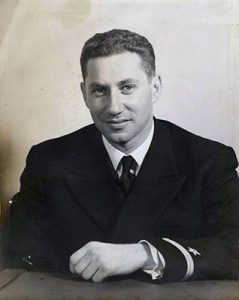 they found themselves handicapped by the lack of trial footage. Adding the complexity of their task was the necessity of synchronizing the sound recordings with the lip movements of defendants such as Hermann Goering.
they found themselves handicapped by the lack of trial footage. Adding the complexity of their task was the necessity of synchronizing the sound recordings with the lip movements of defendants such as Hermann Goering.
Schulberg and Zigman completed the 78-minute documentary in early 1948. It was shown to West German audiences for the first time in November 1948 in the city of Stuttgart. Because of the Soviet Blockade of Berlin, the premiere in that city was delayed until May 1949. But the War Department blocked the film’s release in the United States (although a separate film made by the Soviets under the title Judgment of the People was screened on May 21, 1947 at the Stanley 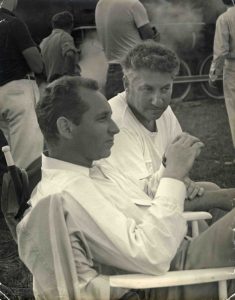 Theatre in Times Square).
Theatre in Times Square).
Because of the ban, Schulberg and Zigman never properly finished their documentary.
But Sandra Schulberg and Josh Waletzky were not about to let that be the final chapter in this filmmaking saga.
Their efforts to complete Nuremberg: Its Lesson for Today and bring it to American audiences is the subject of a different documentary that will also be screened on the final day of this year’s Fort Myers Film Festival with members of the Schulberg  family in attendance. Titled The Lost Film of Nuremberg (2021), it details how Schulberg overcame the loss or destruction of the original negative of the 1948 film, the challenges presented in reconstruction of the sound track and the steps she and her team took to recreate the documentary’s original score.
family in attendance. Titled The Lost Film of Nuremberg (2021), it details how Schulberg overcame the loss or destruction of the original negative of the 1948 film, the challenges presented in reconstruction of the sound track and the steps she and her team took to recreate the documentary’s original score.
But because of their own tenacity and perseverance, you can now see Schulberg and Zigman’s original documentary and hear Justice Robert H. Jackson’s famous opening and closing statements to the Tribunal, and the testimony from the German defendants and their defense attorneys — all in their own voices — as well as bits of the English, Russian and French prosecutors. And finally, new credence can be given the stirring words Justice 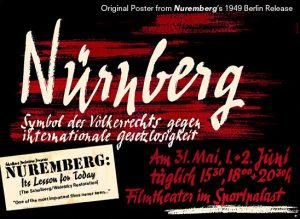 Jackson utters at the film’s end: “Let Nuremberg stand as a warning to all who plan and wage aggressive war.”
Jackson utters at the film’s end: “Let Nuremberg stand as a warning to all who plan and wage aggressive war.”
April 4, 2021.














 Tom Hall is both an amateur artist and aspiring novelist who writes art quest thrillers. He is in the final stages of completing his debut novel titled "Art Detective," a story that fictionalizes the discovery of the fabled billion-dollar Impressionist collection of Parisian art dealer Josse Bernheim-Jeune, thought by many to have perished during World War II when the collection's hiding place, Castle de Rastignac in southern France, was destroyed by the Wehrmacht in reprisal for attacks made by members of the Resistance operating in the area. A former tax attorney, Tom holds a bachelor's degree as well as both a juris doctorate and masters of laws in taxation from the University of Florida. Tom lives in Estero, Florida with his fiancee, Connie, and their four cats.
Tom Hall is both an amateur artist and aspiring novelist who writes art quest thrillers. He is in the final stages of completing his debut novel titled "Art Detective," a story that fictionalizes the discovery of the fabled billion-dollar Impressionist collection of Parisian art dealer Josse Bernheim-Jeune, thought by many to have perished during World War II when the collection's hiding place, Castle de Rastignac in southern France, was destroyed by the Wehrmacht in reprisal for attacks made by members of the Resistance operating in the area. A former tax attorney, Tom holds a bachelor's degree as well as both a juris doctorate and masters of laws in taxation from the University of Florida. Tom lives in Estero, Florida with his fiancee, Connie, and their four cats.